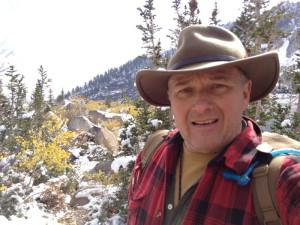Our lives are so regimented that many daily activities hardly get a thought. We can be almost like those numbed people in the old sci-fi movies. One of the hardest things to do is change the regimen. The psychological impact of missing a meal or a dozen meals is greater than the physical effects. Our bodies can adapt wonderfully to trying conditions, such as going without food for even weeks at a time.
Recently in a quest to determine for myself how I would do without food, decided to go on a 3 day trek, backpacking around in the mountains above 10,000 feet, without eating any food. I had read stories for years about amazing survival episodes where they made it out with little or no food at all. I read one eye opening tale about 30 years ago and it has had an impact on my thinking ever since. I have read a lot of literature and studies on lack of food in survival situations, but until now I never put any of it to the test personally. Now I don’t purport to suggest that a person must try everything to know it, i.e. dangerous or harmful things.
I made a video ”Trek 3 Days without ANY Food” on the adventure showing where I went and talking about it on the way. I had other tasks to do as well on the trip so I wanted to show something as normal as it could be, minus any food at all. I knew it would be safe to do, but I did not know what the effect would be on my body and my mind. To give more details about it I also made an audio podcast “Survival without Food.” In this article I will give some facts, some links that I promised in my podcast, and some additional information about what my future plans are.
In my high school years I took some survival classes, I read Larry Dean Olson’s book “Outdoor Survival Skills,” and 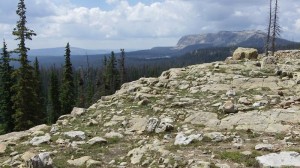 started reading all kinds of other things. I practiced what I could to learn by doing. I found that I had a certain affinity for being out in storms and other adverse weather, I loved camping in blizzards. One of the things I considered early on was the balance of things, and relating to food intake, figuring that in tough conditions the amount of work done should balance with calories available. That was all well and good, but what I did not know then was that a person may be better off not eating at all, further that a person could still exert themselves and be just fine.
started reading all kinds of other things. I practiced what I could to learn by doing. I found that I had a certain affinity for being out in storms and other adverse weather, I loved camping in blizzards. One of the things I considered early on was the balance of things, and relating to food intake, figuring that in tough conditions the amount of work done should balance with calories available. That was all well and good, but what I did not know then was that a person may be better off not eating at all, further that a person could still exert themselves and be just fine.
Why does this thing about eating or not eating even matter?
- Knowing the answers takes away the fear
- It could determine how long you live
- Priorities can be reassigned to match real needs
- Shelter and comfort can be addressed more fully
- Less time wasted doing unproductive things
To most effectively back up my plans I turned to the documented experiences and research of a number of people among the most prominent to me would be Cody Lundin, Mors Kochanski, Andre’-Francois Bourbeau, and Les Stroud. Also in there would be the unlikely, amazing survival story of Helen Klaben “Hey, I’m Alive” and her pilot, who survived a plane crash for 49 days in a bitter Yukon winter, without any food, and not enough water really. In addition a credit to Chris Noble who wrote an article on the subject that appeared after my return. He mentions many things I had read, and a number of bits of great information that I did not have.
Mors Kochanski in his booklets “Basic Wilderness Survival in Deep Snow,” “Basic Wilderness Survival in Cold Lacking Snow,” “Survival Kit Ideas,” “21 Native Wild Edible Plants,” and “Tools of Survival and Survival Training” makes the following points.
- Do not try to live off the land. You can get by 40 days without eating.
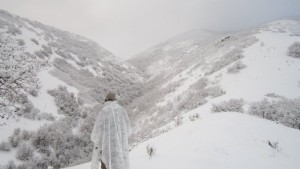
- If hungry, tired or cold, drink more water to improve your condition.
- In attempting to live off the land without knowing what you are doing you can die within a week.
- If you do not have the time to master the identification of 200 wild plants you are not ready to live off the land.
- If you burn more energy gathering your food than it provides, you will live longer resting instead.
- If you can’t find more than 1000 calories per day by foraging you will be better off fasting.
- A person can likely survive an extra day for each pound that one is overweight.
- The inexperienced person brings too much food and too little sleeping gear.
And finally from his latest compilation “Basic Safe Travel and Boreal Survival Handbook” the following excerpt in advocating fasting, by drinking water only, for survival, especially for those not expert in foraging or hunting.
- In attempting to live off the land, it is more preferable to only drink water, than to eat less than the minimum number of calories required each day. In not meeting the basal metabolic rate, which may be from 1100 to 1700 calories per day, there is such a disproportionate use of protein reserves in comparison to fat reserves that one may die of protein depletion in at least a quarter of the time as compared to fasting.
- In an experiment in Sweden ten people walked 320 miles in ten days ingesting only the spring water found enroute. On being examined by doctors after the walk, all were in a perfect state of health.
- Fasting usually bring on greater clarity of thought and improved recall that assists in making plans and decisions.
Andre’-Francois Bourbeau is not as famous as many others, but that does not lessen his knowledge and incredible 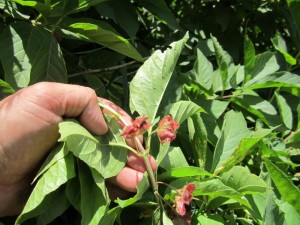 experience. In his book “Wilderness Secrets Revealed – Adventures of a Survivor” he tells of a lifetime of purposeful scenarios he put himself into. He debunks many survival ideas and methods as things copied from one book to another, rather than proven. Though very well experienced in real life adventures he still at times discovered finding adequate food impossible, such as during a week in a blizzard. He holds a Guinness World Record for longest voluntary wilderness survival. We cannot predict what circumstances may be in play when we may be forced into a survival situation, it may be in a winter blizzard, or in a desolate area in a drought, there may be no trees or brush, no animals may be present to trap. I’ve read stories of all those things and many more.
experience. In his book “Wilderness Secrets Revealed – Adventures of a Survivor” he tells of a lifetime of purposeful scenarios he put himself into. He debunks many survival ideas and methods as things copied from one book to another, rather than proven. Though very well experienced in real life adventures he still at times discovered finding adequate food impossible, such as during a week in a blizzard. He holds a Guinness World Record for longest voluntary wilderness survival. We cannot predict what circumstances may be in play when we may be forced into a survival situation, it may be in a winter blizzard, or in a desolate area in a drought, there may be no trees or brush, no animals may be present to trap. I’ve read stories of all those things and many more.
If a person can adopt the concept of fasting for survival, it may alleviate much stress and eliminate unnecessary risk trying to get the unobtainable.
“Almost everybody who travels, it seems, worries about starving in a survival situation. In reality such concerns are largely overblown: you can survive for a month (or longer) without putting any food in your body. This is hard for some people to wrap their heads around…-Les Stroud, “Survive!”
Cody Lundin in his book “98.6 Degrees: The Art of Keeping Your Ass Alive” states, “…unless you trap for a living, your chances of harvesting more calories than you’ll use dinking around is debatable.” Also a warning, “Don’t be fooled by instructors who perpetuate the myths that you can effortlessly “live off the fat of the land” or that survival is easy.” Cody also explains what we have learned from research that initially in the first few days of going without any food the body uses up its convenient stores of glucose and begins to use fatty acids which are stored in the body. Two things happen with this change, 1) the body is able to better make the conversion so that it can make up a large part of the energy requirements, and 2) the BMR (base metabolism rate) is reduced by as much as 21% eventually, resulting in lowering energy requirements.
Here is a caution in extended situations, Cody states that studies show this changeover is reversed by eating as little as 500 calories per day. This coincides with Mors teachings that if you cannot easily meet your BMR of about 1200 calories a day in harvested food, it is better and you will live longer by simply fasting with water intake.
Let me finish up this last section with some excellent information from Chris Noble’s article “Edible Wild Plants for Survival, (Not) So Fast!” To me the most interesting part of his piece the last part Finding Calories in The Plant Kingdom. He examines what it would take from a few common plants to get the calories to meet your BMR.
- Cattails – provide 7 calories per ounce meaning you would need to eat around 12 pounds per day!
- Inner Pine Bark – about 500 calories per pound, so 2-3 pounds would need to be consumed per day.
- Acorns – 142 calories per ounce or nearly a pound per day. Difficult to do with the processing need to make them edible, not to mention the very limited time they are available.
Chris makes the point that animals are much more suited to meet our caloric needs than trying to consume plants. In his article he is not at all railing against eating food or taking some proper food bars with you in your pack, but he makes the salient point that we cannot casually figure that we can easily provide for ourselves because we know some plants.
Here are a few animal calorie counts Chris mentions, these are for 3 ounces of meat.
- Jack Rabbit – 131 calories
- Squirrel – 140 calories
- Rainbow Trout – 140 calories
For meeting caloric needs it is apparent that in the wilds a person would be much better off eating animals than plants. Of course all this hinges on your knowledge and skills, the area you are in, and the time of the year. There is nothing wrong with eating whatever you know is good in the short term; for longer 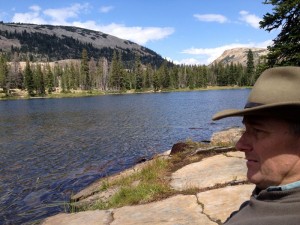 term, fasting may be easier and much safer. In my little experience of nearly 4 days without any food, the mental aspect was much more apparent than the physical lack of food. I experienced no pain, very little discomfort, and little noticeable energy loss. I am planning in the near future to do another experiment at perhaps 5 or 6 days without any food on a trek.
term, fasting may be easier and much safer. In my little experience of nearly 4 days without any food, the mental aspect was much more apparent than the physical lack of food. I experienced no pain, very little discomfort, and little noticeable energy loss. I am planning in the near future to do another experiment at perhaps 5 or 6 days without any food on a trek.
I have tried to provide links in this article to all the referenced material. I thank all those mentioned for their diligent research and real time testing to gain the knowledge they provide.
Until next time this is Perry Peacock, “Simplifying Survival”




